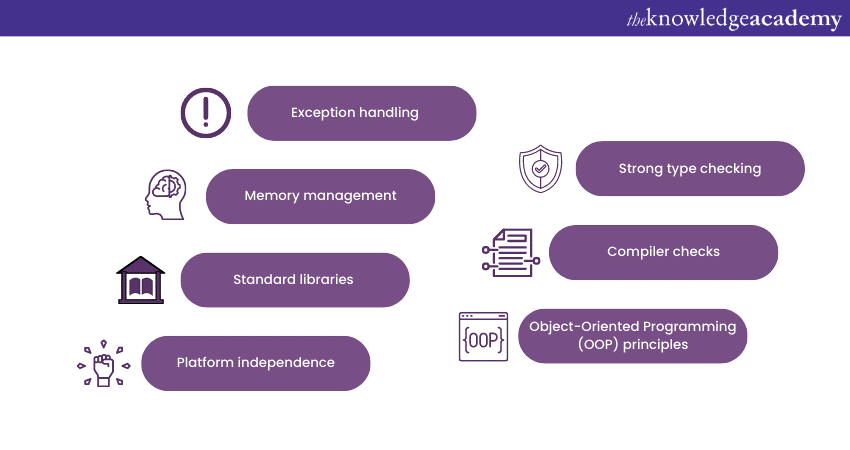We may not have the course you’re looking for. If you enquire or give us a call on +358 942454206 and speak to our training experts, we may still be able to help with your training requirements.
Training Outcomes Within Your Budget!
We ensure quality, budget-alignment, and timely delivery by our expert instructors.

Java, a widely used programming language, is renowned for its "write once, run anywhere" mantra, making it a popular choice for building cross-platform applications. Among its many defining features, Java's robustness stands out as a crucial aspect that contributes to its widespread adoption in various domains. However, many amateur Java Developers and programmers are left to wonder what Robust Meaning in Java is.
According to Statista, Java is preferred and used as a programming language by almost 30.55 per cent of all developers and programmers. In this blog, we will dive into the Robust Meaning in Java, understand its significance, and explore the factors that make Java a robust programming language.
Table of Contents
1) Understanding Robustness in Java
2) Factors Contributing to Robustness in Java
a) Exception Handling
b) Strong type checking
c) Memory management
d) Compiler checks
e) Standard libraries
f) Object-Oriented Programming (OOP) principles
g) Platform independence
3) Conclusion
Understanding Robustness in Java
In the context of Java, robustness refers to the language's ability to handle unexpected situations and errors effectively. A robust programming language like Java can withstand erroneous conditions during program execution without crashing or causing severe malfunctions. Instead, it ensures that the program continues running in a controlled manner, gracefully recovering from errors.
Robustness plays a vital role in enhancing the reliability and stability of Java Applications, making them more resistant to failures and better equipped to handle unforeseen situations. To achieve this level of robustness, Java employs several features and practices.

Factors Contributing to Robustness in Java

The Robust Meaning in Java revolves around its ability to handle errors and unexpected situations efficiently, ensuring stable and reliable application execution. Java's exceptional robustness is a result of its comprehensive exception handling, strong type checking, automatic memory management, and compiler checks. Additionally, the support for object-oriented principles (OOP) and the availability of rich standard libraries contribute to Java's overall robustness. These features collectively make Java a powerful programming language, widely adopted in various industries for developing robust, scalable, and versatile applications.
1.Exception handling
Exception handling is a crucial aspect of programming that deals with managing errors and unexpected situations in a structured manner. When a Java Project encounters an exceptional condition, it throws an exception, which can be caught and handled gracefully. Exception handling prevents the program from crashing and allows developers to take corrective actions, such as logging the error, displaying user-friendly messages, or initiating recovery procedures. By effectively managing exceptions, programmers can build robust and reliable software that can gracefully handle errors, ensuring a smoother user experience and preventing potential security vulnerabilities. Exception handling is an essential tool in building stable and resilient applications.
2. Strong type checking
Strong type checking is a fundamental characteristic of programming languages like Java that ensures rigorous adherence to data types during compilation. It enforces strict rules regarding variable assignments and expressions, minimising the risk of runtime errors. By verifying that data types are compatible at compile time, strong type checking enhances code reliability, readability, and maintainability. It helps catch potential errors early in the development process, reducing debugging time and enhancing software robustness. Programmers benefit from the confidence that their code will execute as intended, making strong type-checking a crucial aspect of creating stable and error-resistant applications.
3. Memory management
Memory management is a crucial aspect of computer systems that ensure efficient utilisation of memory resources. It involves the allocation, tracking, and deallocation of memory to different processes and applications. The primary goal is to optimise memory usage and prevent issues like memory leaks and fragmentation. In modern operating systems, memory management is handled by the operating system's kernel, which allocates memory to processes as needed and reclaims unused memory through techniques like garbage collection. Effective memory management enhances system performance, minimises the risk of crashes, and allows multiple applications to coexist smoothly, contributing to the overall stability and efficiency of the computing environment.
Unlock the power of Java by joining our comprehensive Java Programming Course now!
4. Compiler checks
Compiler checks in the context of programming languages, such as Java, refer to the thorough scrutiny of code performed by the compiler during the compilation process. These checks are designed to identify potential errors and inconsistencies in the code before generating the executable bytecode. By analysing syntax, type compatibility, and other language-specific rules, the compiler ensures that the code adheres to the language's specifications. Compiler checks play a crucial role in promoting code quality, preventing runtime errors, and enhancing the robustness of the final program. Through these rigorous checks, developers can catch and rectify issues early in the development process, leading to more reliable and stable software.
5. Standard libraries
Standard libraries in programming refer to pre-built sets of functions, classes, and modules that come bundled with a programming language. These libraries provide a wide range of functionalities, making it easier for developers to perform common tasks without reinventing the wheel. Standard libraries play a crucial role in enhancing productivity and code quality as they are thoroughly tested, optimised, and maintained by language creators or communities. By leveraging standard libraries, programmers can focus on solving specific problems instead of dealing with low-level implementations. In Java, for instance, the standard library provides classes for file handling, networking, data structures, and more, simplifying development and promoting code reusability.
6. Object-Oriented Programming (OOP) principles
Object-Oriented Programming (OOP) principles are fundamental concepts that form the backbone of modern software development. OOP is a programming paradigm that revolves around organising code into objects, encapsulating data and functionality. The four main OOP principles are inheritance, encapsulation, polymorphism, and abstraction. Inheritance allows classes to inherit properties and behaviours from other classes, promoting code reusability. Encapsulation shields the internal details of objects, enhancing data security and reducing dependencies. Polymorphism enables objects to take on multiple forms, promoting flexibility in code design. Abstraction simplifies complex systems by focusing on relevant details. By adhering to these principles, developers can create modular, maintainable, and scalable software solutions with ease.
7. Platform independence
Platform independence, a fundamental characteristic of Java, refers to the ability of Java programs to run unchanged on any platform with a Java Virtual Machine (JVM). By compiling Java source code into bytecode, a platform-neutral format, Java achieves this portability. This concept revolutionised software development, as it eliminated the need to create platform-specific builds for different operating systems. With platform independence, developers can write code once and deploy it on Windows, macOS, Linux, or any other system supporting JVM. This versatility empowers developers to reach a broader audience and ensures that Java applications maintain consistent functionality and performance across various environments.
Become a Java Engineer and take our advanced Java Engineer Training and propel your career to new heights!
Conclusion
Understanding the Robust Meaning of Java empowers developers to build high-quality software that can withstand real-world challenges, making it a preferred choice for critical and large-scale projects. As developers harness the robustness of Java, they can create software that not only delivers a seamless user experience but also maintains stability and reliability, even in the face of unexpected situations.
Level up your coding skills with our expert-led Java Training.
Frequently Asked Questions
Upcoming Programming & DevOps Resources Batches & Dates
Date
 Java Programming
Java Programming
Mon 9th Dec 2024
Mon 6th Jan 2025
Mon 13th Jan 2025
Mon 20th Jan 2025
Mon 27th Jan 2025
Mon 3rd Feb 2025
Mon 10th Feb 2025
Mon 17th Feb 2025
Mon 24th Feb 2025
Mon 3rd Mar 2025
Mon 10th Mar 2025
Mon 17th Mar 2025
Mon 24th Mar 2025
Mon 7th Apr 2025
Mon 14th Apr 2025
Mon 21st Apr 2025
Mon 28th Apr 2025
Mon 5th May 2025
Mon 12th May 2025
Mon 19th May 2025
Mon 26th May 2025
Mon 2nd Jun 2025
Mon 9th Jun 2025
Mon 16th Jun 2025
Mon 23rd Jun 2025
Mon 7th Jul 2025
Mon 14th Jul 2025
Mon 21st Jul 2025
Mon 28th Jul 2025
Mon 4th Aug 2025
Mon 11th Aug 2025
Mon 18th Aug 2025
Mon 25th Aug 2025
Mon 8th Sep 2025
Mon 15th Sep 2025
Mon 22nd Sep 2025
Mon 29th Sep 2025
Mon 6th Oct 2025
Mon 13th Oct 2025
Mon 20th Oct 2025
Mon 27th Oct 2025
Mon 3rd Nov 2025
Mon 10th Nov 2025
Mon 17th Nov 2025
Mon 24th Nov 2025
Mon 1st Dec 2025
Mon 8th Dec 2025
Mon 15th Dec 2025
Mon 22nd Dec 2025







 Top Rated Course
Top Rated Course


 If you wish to make any changes to your course, please
If you wish to make any changes to your course, please


